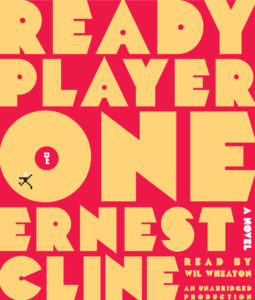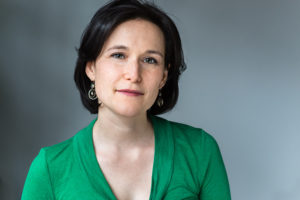Hey audiobookers! This week, we’re continuing our doing behind-the-scenes look at audiobook creation with a guest post by Jordanna Max Brodsky, author of The Immortals, which Whoopi Goldberg (a huge audiobook lover) picked as a Summer Reading Pick for The View. Before we get into that, though, I want to address the fact a lot of us feel like we are swimming in tragedy these days. There’s an ongoing crisis in Puerto Rico and other hurricane-devastated areas, the shooting in Las Vegas killed and injured a horrifying number of people–it’s just a lot. And while it can be a time to remember what we’re grateful for, or spur us to action, we also need to be soothed. So, I want to know which audiobooks and narrators you find the most soothing. Hit me up on Twitter or send an email to katie@riotnewmedia.com and I’ll compile a list for next week.
Sponsored by Penguin Random House Audio
 Like most of humanity, Wade Watts escapes his grim surroundings by spending his waking hours jacked into the OASIS, a sprawling virtual utopia, partly because its creator James Halliday has hidden a series of keys in it. Whoever finds all the keys and solves all the riddles will win big time. When Wade stumbles on the first key, suddenly the race is on. Wil Wheaton narrates the audiobook edition of this pop-culture loving adventure-filled quest.
Like most of humanity, Wade Watts escapes his grim surroundings by spending his waking hours jacked into the OASIS, a sprawling virtual utopia, partly because its creator James Halliday has hidden a series of keys in it. Whoever finds all the keys and solves all the riddles will win big time. When Wade stumbles on the first key, suddenly the race is on. Wil Wheaton narrates the audiobook edition of this pop-culture loving adventure-filled quest.
Without further ado, here’s Jordanna Max Brodsky on narrating her own audiobook and the unusual experience of being both storyteller and listener, reader, and writer.
A Novelist-Narrator’s Labor of Love
by: Jordanna Max Brodsky
 For the first time, I am both the reader and writer of my own book. The listener and the storyteller. Most thrillingly, I become its heroine, inhabiting her every emotion, her every action—even as I watch her tale unfold anew. That’s the power of narrating my own audiobook.
For the first time, I am both the reader and writer of my own book. The listener and the storyteller. Most thrillingly, I become its heroine, inhabiting her every emotion, her every action—even as I watch her tale unfold anew. That’s the power of narrating my own audiobook.
The recording booth feels like a sacred space. In it, I’ve found the sort of solitude and focus that novelists constantly seek and rarely acquire. At home, the phone rings, family intrudes. In the library, patrons bicker and children whine. Even when I’ve managed to unhook from the Internet and block out everyone I love, life’s ceaseless distractions beckon from afar. But when the heavy studio door whooshes shut and I raise the page of my book before my eyes, there’s only my story, my characters, and me. I have nowhere else to be, nothing else to do. Even the director, sitting just beyond the glass, is nothing but a disembodied voice who only occasionally interrupts my tale with a bit of encouragement or advice.
As a novelist, I reread my own book dozens of times before it goes to print. By the final copyedit, I know most of the passages by heart, and I’m capable of overlooking the same typo five times in a row. We’re often told to read our writing aloud to get a new perspective. That advice works great for a scene or a chapter, but no one ever mentions just how hard it is to read an entire four hundred-page novel out loud to yourself in the final editing stages. Sooner or later (usually sooner), your voice tires, you get bored, you start reading without listening to a damn word you’re saying. But step in front of a microphone, slide the headphone over your ears, and…magic. The story is reborn.
 Inside the booth, I stop remembering previous versions of lines or worrying about whether chapter length. Instead, with my own voice echoing back through the headphones, I can read and listen at the same time—the best kind of ambidexterity for a writer. For hours at a time, for several days in a row, I live in my story. We generally record chronologically, so I get to experience the tale just as the reader does, from careful exposition to rousing climax to satisfying denouement.
Inside the booth, I stop remembering previous versions of lines or worrying about whether chapter length. Instead, with my own voice echoing back through the headphones, I can read and listen at the same time—the best kind of ambidexterity for a writer. For hours at a time, for several days in a row, I live in my story. We generally record chronologically, so I get to experience the tale just as the reader does, from careful exposition to rousing climax to satisfying denouement.
I write because I’m happiest when completely subsumed in a story, and I can imagine no greater privilege than to create those stories for others. Yet it can be hard to fall into a story of my own creation in quite the same way. I know how the characters have evolved over the course of the process. Perhaps they’ve changed names or personalities or fates. Even though I see them more vividly than a reader might, I also see the shadows of their former selves, the scars of my sculpting and slicing. But in the recording booth, they jump off the page and take on lives of their own. As a writer, I create their words. As a narrator, I actually speak them. And unlike a reading at a bookstore or library, where I feel slightly absurd shouting or weeping or laughing through the dialogue, an audiobook demands that I inhabit the characters completely. When my heroine cries, I cry. When my villain growls, I growl. By the end, I’m exhausted, hoarse, and covered in sweat—but also reveling in the remembered thrill of writing the final line of the final chapter and turning off my computer for the night.
I wish all authors got a chance to record their own audiobooks. Not only for the pleasure, but for the instruction. Even as the story sweeps me along, I sometimes hit the odd boulder in the current: a word that I suddenly realize breaks the rhythm of a line, a phrase that feels out of place for a character, that last typo I could’ve sworn wasn’t there a month before. At that point, of course, it’s generally too late. The book is off to the printers, and all I can do is tuck away the lesson for the next novel. If I had my druthers, I’d sneak into the studio halfway through the writing process and record a version just for myself. I’d walk out with all sorts of insights I couldn’t get any other way—and probably an arrest record for trespassing.
So for now, I’ll leave the audiobook recording where it is: the final frenzied push in the long labor of bringing forth a novel, complete with sweat and screams and an aching back. When it’s all over, I get to hand over that squalling new child to the whole world. It’s not mine any longer—it belongs to those who read it. But unlike most authors, my voice will remain to shepherd it along. To give it life. I hope that’s a gift to my readers. I darn well know it’s a gift to me.